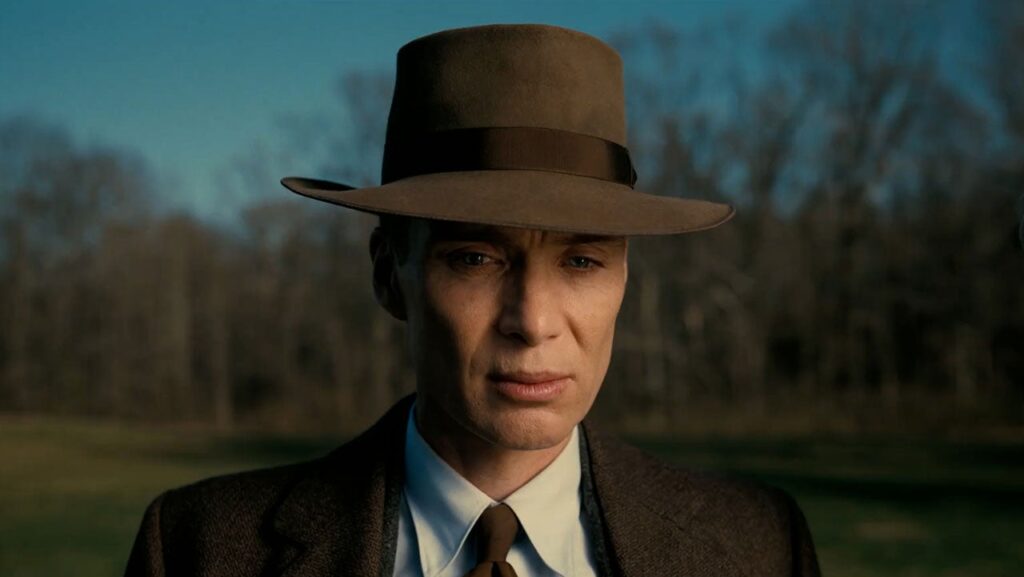
Christopher Nolan’s metaphysical mindscape is one I would want to enter. The filmmaker’s fascination for time, history, and volatile men like Oppenheimer triggers curiosity in every film fan – whether they enjoy his cinema or not. With some slow burn, some magnificent spectacles, and some emotionally dense titles, the auteur’s filmography is a variegated mix. This way, his cinematic grasp, more often than not, intrigues – rendering immense repeat value to several of his titles.
A fervid Cillian Murphy headlines Nolan’s latest directorial Oppenheimer – adapted from a gripping biography of its subject entitled, ‘American Prometheus: The Triumph and Tragedy of J. Robert Oppenheimer’. Diametrically different from anything the filmmaker has made to date, Oppenheimer comes with an incessantly verbose narrative. So much so that it makes a profound statement or two in each passing minute. Flinch an eye, you would miss a detail in Nolan’s astute chronicle of the life and times of the man who led the notorious Manhattan Project – Dr. J. Robert Oppenheimer.
Narrated through intertwined timelines, the film packs several chapters from Oppenheimer’s life while intelligently revealing his paradoxical ways. The most telling of all in the early reels is one where he attempts to poison his professor Patrick Blackett (James D’Arcy) by injecting potassium cyanide into an apple. Although conventionally written and staged, the drama contained in this brief sequence sets the tone of what lies ahead. The cinematography is gorgeous as it oscillates dangerously between intense close-ups, somber monochromes (in a specific chapter), raw sensuality, and pure IMAX magnificence. While it is a rare Nolan film that is devoid of definitive set pieces, there is one banger of a scene a little after the midpoint set somewhere in the deserts of New Mexico.
Oppenheimer also dishes out American history lessons, which are told through a lens that subtly eulogizes the man who is hailed as ‘the father of the atomic bomb’. Upon the discovery of fission in the late ‘30s, science, at the hands of the eccentric theoretical physicist, became – to put it mildly – a plaything of a prodigious elite. Couple it with the hunger for power – in the system, amid the cold war, and also within the man’s psyche – we witness an event that destructed the very atlas of humanity.
The film derives its source from a literary piece that bears an assertive yet philosophical tone. Giving this narrative choice the benefit of the doubt, Nolan does carve a finite structure to Oppenheimer’s guilt and complexities. To give the leading man due credit, Murphy seldom lets Oppenheimer become a distant entity. He is right there among us. That said, the screenplay’s propensity to look at him with empathy and the event as a byproduct of inevitability is baffling. The film does not call out any of it explicitly. The implication is subtle although it doesn’t take one to be overly bright to spot a white savior’s plight for the umpteenth time.
 Nolan also delves into Oppenheimer’s relationships. The scientist’s notorious extra-marital affair with Jean Tatlock (Florence Pugh) stands marvelously chronicled. The ‘Bhagvat Gita’ quote in one of their interactions is bound to catch the attention of those watching the film in India. Although a lot less exciting, Oppenheimer’s exchanges with his wife Kitty (Emily Blunt) extract ideas about the man’s duality.
Nolan also delves into Oppenheimer’s relationships. The scientist’s notorious extra-marital affair with Jean Tatlock (Florence Pugh) stands marvelously chronicled. The ‘Bhagvat Gita’ quote in one of their interactions is bound to catch the attention of those watching the film in India. Although a lot less exciting, Oppenheimer’s exchanges with his wife Kitty (Emily Blunt) extract ideas about the man’s duality.
The film constantly comments about its protagonist’s left-leaning ways – which I wasn’t aware of, unlike a lot of the plot’s scientific detailing and historical plot points. It was amusing to learn how the man whose profound ideas never let him turn into a full-fledged Communist despite being surrounded by true-blue spearheaders. The politics of Nolan’s film is a bit perplexing too, for a fact I could barely muster up the courage to filter out the human in ‘Oppie’ casting away the lordly belief in him that led to the biggest misuse of atomic energy in world history.
Oppenheimer, even though a heavily conversational film, is not the most engaging of biographies. It does not allow breathing space to its people for most parts of its runtime. The intimate nature of the screenplay limits a lot of its proceedings to interiors – often claustrophobia-inducing with way too many close-ups – thereby stripping the film of a solid ambiance. The knotted timelines and ultra-fast editing do not help much in altering the impact here. The information overload and the onslaught of gazillion peripheral players cavalierly add to the chaos.
Murphy in the central role, aside from a staggering resemblance to the physicist, is intense and lends many hues that the film screenplay doesn’t. The ensemble cast consisting of many Hollywood biggies is proficient with Florence Pugh, Kenneth Branagh, and Benny Safdie being the pick of the lot.
Oppenheimer – with Ludwig Göransson’s terrific original score setting the mood – is a unique outing for Christopher Nolan. While I wouldn’t call it his bravest yet, it’s perhaps the one with maximum fodder for diverse points of view. A Canadian watching the film may not decipher it the way a Japanese or an Icelandic person would. Nolan’s latest film is here to make way for many perspective pieces and debates while quietly setting the world box office ablaze. Sweet deal, I reckon.
Rating: ★★★ 1/2

